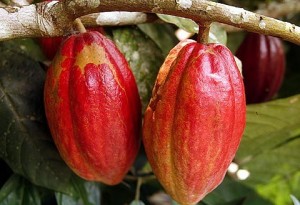Experts advocate ecosystems services for environmentally-sustainable cocoa production
 Experts have warned that Ghana’s cocoa production would decline if the expansive cocoa under no shade system, which destroys the ecosystem, is not halted.
Experts have warned that Ghana’s cocoa production would decline if the expansive cocoa under no shade system, which destroys the ecosystem, is not halted.
They said the practice, which seeks to increase productivity through forest shade removal and chemical inputs, though beneficial in the short term, is inimical to ecological sustainability and economic outcomes in the cocoa landscape, in the long run.
Thus they have called for the promotion of ecosystems services among smallholder cocoa farmers, which would engender sustainable use of forest cover, ultimately leading to improved ecological footprints and greater economic benefits to farmers.
They gave the caution at a day’s knowledge event on ecosystems services in Ghana’s cocoa sector, in Accra, organized by the SNV Netherlands Development Organization in collaboration with the Ghana Cocoa Board in Accra.
The event forms part of an initiative to increase stakeholders’ awareness on current and emerging measures for the maintenance and application of ecosystem services in the cocoa sector.
It is also part of activities under the Cocoa-eco project, which is being implemented by SNV in collaboration with Kuapa Kokoo Farmers Union and International Institute of Tropical Agriculture (IITA) in 10 selected cocoa districts of Ghana.
The main aim of the project is to demonstrate improved productivity through good agricultural practices as well as sustaining ecosystems services among smallholder cocoa farmers.
Dr Andre de Jager, the Country Director of SNV Netherlands Development Organization, who decried the current trend of expansive cocoa under no shade system, called on both private and public sector organizations in the sector to help deepen the understanding and promotion of the beneficial interactions between forest ecosystems and cocoa trees in a way that provide optimum benefits to poor cocoa smallholders.
He said though cocoa is a major commodity for Ghana’s economy, the sector is plagued with challenges that ought to be addressed holistically for the country to derive the maximum benefits from cocoa.
The cocoa sector, the highest foreign exchange earner for the country, provides livelihood for more than 800,000 households in Ghana but faces challenges such as low and declining productivity, limited access to planting material and inputs,limited technological innovations, aging farmers and trees as well as emerging threats of climate change that pose a threat to current and future production demand.
Dr Andre stressed the need for the intensification of education on sustainable cocoa production that provides optimum economic and social benefits for smallholder farmers, while maintaining the eco system.
Convening at the event, various researchers from Cocoa Research Institute of Ghana , International Institute of Tropical Agriculture Kwame Nkrumah University of Science and Technology and Council for Scientific and Industrial Research’s Soil Research Institute presented various studies and pilot interventions aimed at increasing the understanding and promotion of ecosystems services that favour cocoa.
Key areas include potential for diversifying on-farm shade trees to meet the required crown cover and increase carbon stock, while ensuring optimum productivity; advances made in the biological control of mirids; potential for using cocoa husk biochar to complement soil nutrient in smallholder farms; and balancing other uses of cocoa husk with its maintenance as habitats for cocoa pollinating midges.
Dr Richard Asare, a researcher with the Consultative Group for International Agricultural Research said the no shade cocoa farming method is dwindling forest resources in the country, warning that Ghana could soon be importing timber if the situation is not managed well.
He explained that all value trees for export are located on cocoa farms and that if farmers are not sensitized on the need to keep existing trees and plant more for trees, the cocoa and agro-forestry sector could see dwindling fortunes soon.
Source: GNA
